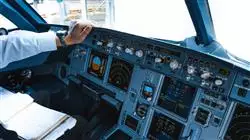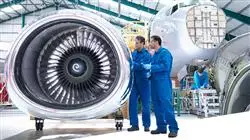University certificate
The world's largest faculty of engineering”
Introduction to the Program
Enroll now in a university course that provides you with the most complete and up-to-date program on the Integral Sustainability of Aeronautical Engineering"

Aviation as an engine of connectivity and growth is currently committed to the Sustainable Development Goals (SDGs) approved by the UN in 2015. A commitment that has led it to implement actions aimed at considerably reducing its impact on the environment.
In this scenario, it is essential that engineering professionals who wish to progress successfully in this industry are aware of the goals set in this field, the aviation law that regulates the entire activity, as well as the development of air transport and its future challenges. A set of subjects that brings together this Postgraduate diploma in Integral Sustainability of Aeronautical Engineering created by TECH to provide students with a very useful learning in their daily work performance.
It is, therefore, a unique opportunity to acquire an education from a theoretical-practical perspective and through numerous teaching resources such as multimedia pills, diagrams, specialized readings or scenario simulations. An excellent material prepared and elaborated by professionals specialized in aeronautical engineering and with consolidated trajectory in the industry.
Also, thanks to the Relearning method, based on the continuous reiteration of key concepts, students will be able to advance through the syllabus in a simple way, consolidating the contents in a simpler way and thus reducing the long hours of study.
An unparalleled academic option, which allows graduates to manage their own access time with greater freedom, and to consult the program whenever and wherever they wish from a digital device with an Internet connection. Thus, with no classroom attendance or scheduled classes, students will be able to reconcile their daily activities with a first class education.
Master international aviation regulation in a short time and with the most innovative teaching material"
This Postgraduate diploma in Integral Sustainability of Aeronautical Engineering contains the most complete and up-to-date educational program on the market. Its most outstanding features are:
- Development of case studies presented by experts in Aeronautical engineering
- Graphic, schematic, and practical contents with which they are created, provide scientific and practical information on the disciplines that are essential for professional practice
- Practical exercises where the self-assessment process can be carried out to improve learning
- Its special emphasis on innovative methodologies
- Theoretical lessons, questions to the expert, debate forums on controversial topics, and individual reflection work
- Content that is accessible from any fixed or portable device with an Internet connection
A 100% online Postgraduate Diploma that in only 6 months will allow you to deepen in the management of airport infrastructures and the environmental implications of aviation"
The program includes in its teaching staff professionals from the sector who bring to this program the experience of their work, as well as recognized specialists from leading societies and prestigious universities.
Its multimedia content, developed with the latest educational technology, will provide the professionals with situated and contextual learning, i.e., a simulated environment that will provide an immersive education programmed to learn in real situations.
The design of this program focuses on Problem-Based Learning, by means of which the professionals must try to solve the different professional practice situations that are presented throughout the academic course. This will be done with the help of an innovative system of interactive videos made by renowned experts.
Enroll now in a flexible university education, which you can access whenever you want, from your computer with Internet connection"

With this program, delve into the configuration of the global market, trends and perspectives of air transport in the 21st century"
Why study at TECH?
TECH is the world’s largest online university. With an impressive catalog of more than 14,000 university programs available in 11 languages, it is positioned as a leader in employability, with a 99% job placement rate. In addition, it relies on an enormous faculty of more than 6,000 professors of the highest international renown.

Study at the world's largest online university and guarantee your professional success. The future starts at TECH”
The world’s best online university according to FORBES
The prestigious Forbes magazine, specialized in business and finance, has highlighted TECH as “the world's best online university” This is what they have recently stated in an article in their digital edition in which they echo the success story of this institution, “thanks to the academic offer it provides, the selection of its teaching staff, and an innovative learning method aimed at educating the professionals of the future”
A revolutionary study method, a cutting-edge faculty and a practical focus: the key to TECH's success.
The most complete study plans on the university scene
TECH offers the most complete study plans on the university scene, with syllabuses that cover fundamental concepts and, at the same time, the main scientific advances in their specific scientific areas. In addition, these programs are continuously being updated to guarantee students the academic vanguard and the most in-demand professional skills. In this way, the university's qualifications provide its graduates with a significant advantage to propel their careers to success.
TECH offers the most comprehensive and intensive study plans on the current university scene.
A world-class teaching staff
TECH's teaching staff is made up of more than 6,000 professors with the highest international recognition. Professors, researchers and top executives of multinational companies, including Isaiah Covington, performance coach of the Boston Celtics; Magda Romanska, principal investigator at Harvard MetaLAB; Ignacio Wistumba, chairman of the department of translational molecular pathology at MD Anderson Cancer Center; and D.W. Pine, creative director of TIME magazine, among others.
Internationally renowned experts, specialized in different branches of Health, Technology, Communication and Business, form part of the TECH faculty.
A unique learning method
TECH is the first university to use Relearning in all its programs. It is the best online learning methodology, accredited with international teaching quality certifications, provided by prestigious educational agencies. In addition, this disruptive educational model is complemented with the “Case Method”, thereby setting up a unique online teaching strategy. Innovative teaching resources are also implemented, including detailed videos, infographics and interactive summaries.
TECH combines Relearning and the Case Method in all its university programs to guarantee excellent theoretical and practical learning, studying whenever and wherever you want.
The world's largest online university
TECH is the world’s largest online university. We are the largest educational institution, with the best and widest online educational catalog, one hundred percent online and covering the vast majority of areas of knowledge. We offer a large selection of our own degrees and accredited online undergraduate and postgraduate degrees. In total, more than 14,000 university degrees, in eleven different languages, make us the largest educational largest in the world.
TECH has the world's most extensive catalog of academic and official programs, available in more than 11 languages.
Google Premier Partner
The American technology giant has awarded TECH the Google Google Premier Partner badge. This award, which is only available to 3% of the world's companies, highlights the efficient, flexible and tailored experience that this university provides to students. The recognition as a Google Premier Partner not only accredits the maximum rigor, performance and investment in TECH's digital infrastructures, but also places this university as one of the world's leading technology companies.
Google has positioned TECH in the top 3% of the world's most important technology companies by awarding it its Google Premier Partner badge.
The official online university of the NBA
TECH is the official online university of the NBA. Thanks to our agreement with the biggest league in basketball, we offer our students exclusive university programs, as well as a wide variety of educational resources focused on the business of the league and other areas of the sports industry. Each program is made up of a uniquely designed syllabus and features exceptional guest hosts: professionals with a distinguished sports background who will offer their expertise on the most relevant topics.
TECH has been selected by the NBA, the world's top basketball league, as its official online university.
The top-rated university by its students
Students have positioned TECH as the world's top-rated university on the main review websites, with a highest rating of 4.9 out of 5, obtained from more than 1,000 reviews. These results consolidate TECH as the benchmark university institution at an international level, reflecting the excellence and positive impact of its educational model.” reflecting the excellence and positive impact of its educational model.”
TECH is the world’s top-rated university by its students.
Leaders in employability
TECH has managed to become the leading university in employability. 99% of its students obtain jobs in the academic field they have studied, within one year of completing any of the university's programs. A similar number achieve immediate career enhancement. All this thanks to a study methodology that bases its effectiveness on the acquisition of practical skills, which are absolutely necessary for professional development.
99% of TECH graduates find a job within a year of completing their studies.
Postgraduate Diploma in Integral sustainability of aeronautical engineering
Sustainability is one of the most relevant and challenging topics today, and aeronautical engineering is no exception. At TECH Global University, we are committed to the training of experts in sustainability, that is why we present you our postgraduate Postgraduate Diploma in Integral sustainability of aeronautical engineering, focused on the training of professionals with knowledge and skills to face the challenges of the aerospace industry in environmental and social matters.
In this online classroom program, you will learn about environmental rules and regulations applied to the aeronautical industry, as well as environmental impact assessment and waste management. In addition, topics such as energy efficiency, carbon footprint and the use of clean and renewable technologies in the operation of aircraft and in the manufacture of aeronautical components will be addressed. Also, the social impact of the industry will be analyzed, considering issues such as noise and air safety, and tools and methodologies for the management of corporate social responsibility will be evaluated. With this online postgraduate course, you will be able to expand your knowledge and skills to contribute to a more sustainable aeronautical industry committed to the well-being of people and the planet.







